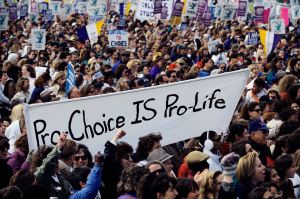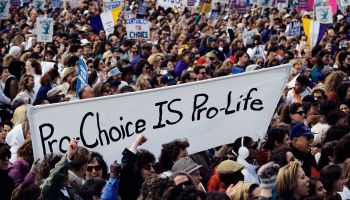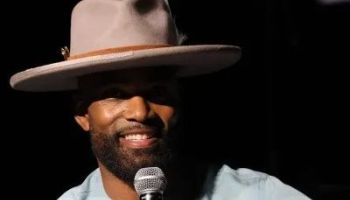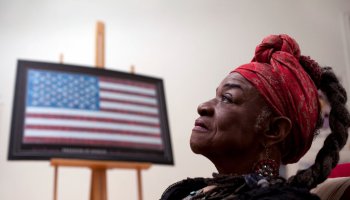In a Breakfast Club interview last month, entertainer/Howard University student Nick Cannon made headlines that had nothing to do with his latest projects. While commenting on our nation’s political system and systemic racism, the America’s Got Talent host repeated long debunked falsehoods about Planned Parenthood and abortion, calling them“real genocide.”
“Think about all the stuff Hillary [Clinton] did with Planned Parenthood and all that type of stuff,” he said. “That type of stuff is to take our community—and forget gentrification; it’s real genocide, and it’s been like that for years.”
He doubled down on his comments in another interview saying that Planned Parenthood engages in “population control” and “modern-day eugenics.”
The organization addressed the issue by tweeting Cannon in the hopes he would read Imani Gandy’s pivotal Rewire article on the history of founder Margaret Sanger and her relationship with the Black community. Cannon responded by saying he’d already read it, and told another Twitter user that he never said the statements in the video.

Source: Viviane Moos / Getty
As a business student, I admire Cannon’s successful career in entertainment. At a young age, he turned his music career into several business ventures, including creating and producing his own television shows through his entertainment company Ncredible, becoming chairman of TeenNick, a subsidiary of Nickelodon, and branding his own headphones, in his capacity as Chief Creative Officer of RadioShack, of which I own a pair. Despite my respect for his business acumen and awareness raising around our nation’s systemic inequalities, I believe Cannon is amiss on the issue of abortion.
In 2005, Cannon released the single “Can I Live,” the lyrics and video to which feature an adult Cannon singing to his then-pregnant mother, who had him at 17. The video shows the teen sitting at an abortion clinic, whose services she ultimately decided against. At the time, he told USA Today that the song was not a statement about abortion, explaining, “I didn’t make the song to make a political statement. I’m just thanking my mom for being strong.” Adding, “I’m not pro-life or pro-choice. I’m pro-Nick. I’m just happy to be here.” However, his recent commentary suggests his views have taken a dramatic turn.
Cannon isn’t the only one to fall for the debunked abortion rhetoric and subterfuge from the right. In August, Baltimore Raven’s tight end Ben Watson, who blogs about “racial tension,” espoused similar views in an interview with an anti-abortion pregnancy center.
“I wouldn’t say I have any unique insight,” Watson explains. “I do know that Blacks kind of represent a large portion of the abortions, and I do know that honestly the whole idea with Planned Parenthood and [Margaret] Sanger in the past was to exterminate blacks, and it’s kind of ironic that it’s working.”
During his presidential campaign, retired neurosurgeon and former Republican presidential candidate Ben Carson made similar remarks about abortion clinics being placed in predominantly Black neighborhoods; research has shown that fewer than 1 in 10 are located in communities of color.
Cannon, who has been outspoken in his support for the Black Lives Matter movement and marched outside of the 2016 Republican National Convention, deeply believes in the liberation of Black people. That’s admirable. However, as Black men, we cannot replicate the same systems of oppression and continue to deny Black women autonomy and liberation. Reproductive rights are inextricably linked to the movement for Black lives, and we cannot subjugate and stigmatize Black women for their reproductive choices.

Source: Olivier Douliery / Getty
For starters, Cannon may benefit from additional context about the work of Margaret Sanger, Planned Parenthood and the history of abortion for Black women. In fact, Sanger herself was a birth control advocate, not an abortion advocate, and partnered with W.E.B. DuBois to ensure that Black communities had access to the same reproductive healthcare as Whites. Sanger’s work, while somewhat faulty in direction, was crucial to family planning and celebrated by Dr. Martin Luther King Jr.
“For the Negro intelligent guides of family planning are a profoundly important ingredient in his quest for security and a decent life,” Dr. King Jr. wrote in 1966 for a Planned Parenthood acceptance speech.
Upon accepting the award for her husband, Coretta Scott King said, “Because of [Sanger’s] dedication, her deep convictions, and for her suffering for what she believed in, I would like to say that I am proud to be a woman tonight.”
Women’s rights have always been intertwined with the fight for Black civil rights. Most know Rosa Parks for refusing to give up her seat on the bus, however she was also an advocate against domestic violence and served on the board of Planned Parenthood. And the simple fact is that abortion and birth control among Black women didn’t start with Planned Parenthood or Margaret Sanger – our ancestors were brilliant in their creation of medicines for a whole host of ailments at a time when they were simply used for medical experiments and denied basic care.
During slavery, Black women were known to take cotton root, drink teas, and using knitting needles to induce abortions to prevent heir children from being born into the horrors of slavery amid untold numbers of rape and sexual assault by slave masters. And when abortion was illegal, Black women died and were injured from unsafe abortions at higher rates – something that still faces us today if we continue to deny safe access to the service to low income women.

Source: NewsOne Now Screenshots / NewsOne Now
Cannon, like many others, also fails to acknowledge that Planned Parenthood provides a wide-range of services to people of all genders, from STD and HIV testing to HPV vaccinations to UTI treatments, parenting counseling and more. I know this firsthand because I went to Planned Parenthood as a teen when my then-girlfriend became pregnant. The patient coordinator presented options, including adoption, before we ultimately decided that terminating the pregnancy was the best decision for us.
I have long believed that the role of men is to take shared ownership over the movement for abortion access and reproductive freedom. It takes two for a woman to conceive, thus it must be our shared duty to ensure that the full range of reproductive options – parenting, abortion, and adoption – are accessible for everyone, without shame and stigma. Simultaneously, men must recognize that restrictions on abortion uniquely effect women, and as such we should play a support role to their leadership in the movement.
As Cannon speaks out in support of Black Lives Matter, he must acknowledge that the movement was founded by three Black women who believe that the fight for reproductive justice, abortion access, and queer liberation are part of our own liberation as men.
In a conversation between the movements’ leaders, Alicia Garza explained, “[T]he way we that talk about that is that essentially, it’s not just about the right for women to be able to determine when and how and where they want to start families, but it is also very much about our right to be able to raise families, to be able to raise children to become adults.” She continued, “and that is being hindered by state violence in many different forms. One form being violence by law enforcement or other state forces, and the other form of crisis through poverty and lack of access to resources and lack of access to health communities that are safe and sustainable. So we certainly understand that BLM and reproductive justice go hand in hand.”
Black women are caregivers of our children. With the racist and economic violence plaguing our communities, we must support them in not only raising children, but also deciding to become mothers when they feel they are ready and able to take on the tremendous responsibility of raising our future. As Black men, we cannot cast aside women’s needs simply because they don’t serve our own.
It is true that Black women have abortions at a higher rate than White women, however this isn’t due to a genocidal plot, but rather, a lack of consistent access to birth control and comprehensive sex education, as well as higher rates of sexual assault. With politicians threatening to repeal the Affordable Care Act, and roll back critical access to contraception, it’s imperative that we stand up for reproductive healthcare in full force.
Cannon is allowed to have personal feelings about abortion, as evidenced by his lyrics in “Can I Live,” and it is that very ability to make individual choices based on one’s circumstance that lies at the core of the fight for reproductive freedom. I am thankful that my girlfriend and I were able to exercise our own reproductive choices, and that Planned Parenthood was there for us, as are millions of others.
If we are to expect Black women to stand by our side as we end violence towards Black communities, we must also join them as their access to healthcare is under attack. True Black liberation includes Black women being able to make their own decisions about their pregnancies, and feeling supported in the decision that’s best for them.
My hope is that Cannon, Watson, and other Black men speaking out against racism will grow in their views and center Black women in their fight. The oppression of women has no place in the movement for Black lives. We must trust and support Black women.
Etan Fraser is a JD/MBA candidate at Columbia University, Treasurer and Chairman of the Finance Committee at NARAL Pro-Choice America and Founder of the Etan Project.
Supreme Court Strikes Down Texas Abortion Law
Young Mother Shot Dead After Refusing To Have An Abortion
It’s Time to Stop Spreading Myths About Blacks and Abortion was originally published on newsone.com















